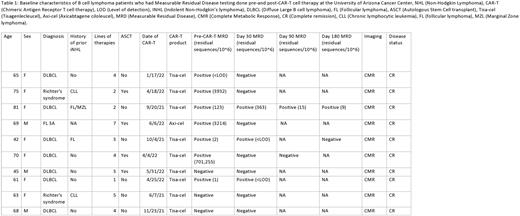Abstract
Background: Anti CD19 Chimeric Antigen Receptor T (CAR-T) cell therapy is an effective treatment option for patients with relapsed/refractory B-cell lymphomas. There is limited data on the impact of CAR-T cell therapy on measurable residual disease (MRD) in the bone marrow of these patients. We hereby report CAR-T cell therapy's efficacy to treat bone marrow MRD in patient with relapsed/refractory B-cell lymphomas.
Methods: In this retrospective review, patients receiving CAR-T cell therapy for relapsed/refractory B-cell lymphomas who had bone marrow MRD evaluation pre-and post-CAR-T infusion at the University of Arizona Cancer Center (UACC) were analyzed. MRD testing was performed via ClonoSEQ (Adaptive Biotechnologies) on bone marrow aspirates prior to CAR-T cell infusion. Patients with MRD+ (10^6) disease had serial MRD evaluations at day+30, +90, +180, +365 post CAR-T cell infusion.
Results:
Thirty-three patients with B-cell lymphomas received CAR-T cell therapy at UACC from January 2019 to July 2022. Bone marrow MRD pre-and post-CART was evaluated in ten patients. Baseline characteristics of these patients are outlined in Table 1. Seven (70%) were female, five (50%) had diffuse large B cell lymphoma (DLBCL), two (20%) patients had Richter's syndrome, two patients had transformed DLBCL from follicular lymphoma (FL), one patient had FL grade 3A. Nine (90%) patients were treated with Tisagenlecleucel and one (10%) patient received Axicabtagene ciloleucel CAR-T product.
Of the ten patients who had MRD testing done pre-and post-CAR-T, seven (70%) had MRD positive disease prior to treatment. Five of the seven patients converted to MRD negative 10^6 post-CAR-T cell infusion. One patient tested MRD positive below the level of detection on day +30 bone marrow aspirate. One patient is still MRD positive 6 months post-CAR-T infusion but the depth of response continues to improve from MRD positive at 10^4 to MRD negative at 10^5, 6 months post-CAR-T infusion. All MRD positive patients achieved complete metabolic response (CMR) based on the positron emission tomography scans.
Conclusion: CAR-T cell therapy has the potential to treat minimal residual disease in patients with B-cell lymphoma. Depth of bone marrow response continues to improve over time. All patients continue to be in CMR. Long term follow-up will help determine if persistent MRD can be used as prognostic marker in B cell lymphomas post CAR-T cell therapy.
Disclosures
No relevant conflicts of interest to declare.
Author notes
Asterisk with author names denotes non-ASH members.


